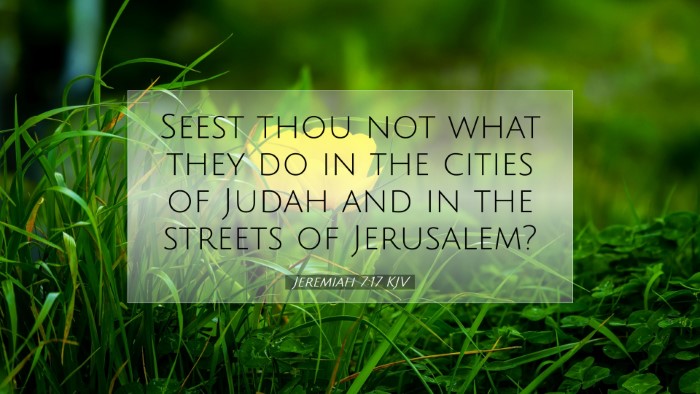Commentary on Jeremiah 7:17
Verse Reference: Jeremiah 7:17 - "Seest thou not what they do in the cities of Judah and in the streets of Jerusalem?"
Contextual Analysis
Jeremiah 7:17 is situated within a poignant chapter in the Book of Jeremiah, which addresses the urgent call for repentance amidst the people of Judah. This verse marks a critical moment in the overall message of Jeremiah concerning the impending judgment of Jerusalem.
Interpretation and Insights
Matthew Henry's Commentary:
Henry emphasizes the watchful nature of God, indicating that He is not oblivious to the actions and moral decay in His chosen people. He points out that the phrase, "Seest thou not," underscores the seriousness of their sins and the divine awareness of their transgressions.
In this context, Jeremiah acts as both a prophet and a witness, bringing to light the disarray of spiritual devotion among the people through their deeds and practices.
Albert Barnes' Notes on the Bible:
Barnes highlights the rhetorical question posed by Jeremiah—inviting reflection on the evident wrongdoings in the cities and streets. He states that this inquiry serves the purpose of awakening conscientiousness among the people.
He explains that the 'cities of Judah' and 'streets of Jerusalem' represent both public and private realms of life, stressing that sin permeates every level of society.
Adam Clarke's Commentary:
Clarke provides a broader perspective by linking the idolatry and abominable practices of the people to the covenantal relationship between God and Judah. He asserts that their actions not only violate ethical standards but also breach their special status before God.
Moreover, Clarke notes that the severity of their transgressions necessitates a prophetic response, which Jeremiah embodies by confronting the people with their realities.
Theological Implications
This verse elicits profound theological implications regarding God’s omniscience and holiness. The inquiry posed by Jeremiah beckons the reader to examine their own lives and assess whether they are living in accordance with God’s standards:
Divine Awareness: It is crucial to understand that God sees all actions, whether hidden or public. The Lord's asking "Seest thou not?" calls attention to collective blindness towards sin that may pervade a community.
Spiritual Accountability: The verse acts as a reminder of the responsibility each individual has in fostering a community of faithfulness and righteousness.
Practical Applications
Pastors, students, theologians, and scholars can derive pertinent applications from Jeremiah 7:17:
- Self-Examination: Encouraging a practice of self-examination within the church community, fostering a culture that prioritizes holiness and repentance.
- Community Awareness: Promoting awareness of societal behaviors and encouraging congregants to actively engage in moral and ethical reform.
Conclusion
Jeremiah 7:17 serves as a sobering reminder that God’s gaze is ever-present upon His people. Through the voices of great commentators like Matthew Henry, Albert Barnes, and Adam Clarke, we glean the importance of heeding God’s call to righteousness, both as individuals and collectively. In light of this verse, let us strive to remain vigilant, recognizing the pervasive realities of sin, and responding with the urgency of repentance and reform.


